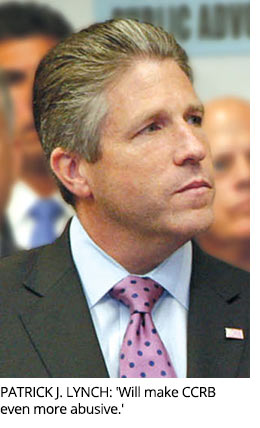




 The Patrolmen’s Benevolent Association has sued the Civilian Complaint Review Board, charging that the agency made a “bold-faced power grab” by declaring it had powers “that far exceed those established by the City Charter.”
The Patrolmen’s Benevolent Association has sued the Civilian Complaint Review Board, charging that the agency made a “bold-faced power grab” by declaring it had powers “that far exceed those established by the City Charter.”
“The CCRB has always been infected with an anti-police bias, and has never lived up to its responsibility under the City Charter to conduct ‘complete, thorough and impartial’ investigations of civilian complaints ‘in a manner in which the public and Police Department have confidence.’ But these recent rule changes are a bold-faced power grab to create a CCRB regime that is more abusive to police officers than ever before,” said PBA President Patrick J. Lynch.
Exceeding Authority
“Through its internal rule-making and resolutions, the CCRB has illegally vested itself with the authority to initiate investigations when no complaint has been made by a member of the public or to pursue complaints when the statute of limitations has expired, just to name two examples that clearly exceed their Charter powers.
“This is not just a case of mission-creep, it is a flat-out violation of the City Charter, existing laws and of legislative mandates.”
The CCRB declined to comment on the suit. The Law Department said it was still reviewing the papers.
The police unions have been hostile to the CCRB since it was established in 1993 and charged with investigating complaints against officers of excessive or unnecessary force, abuse of authority, discourtesy or offensive language. In cases where a CCRB investigation finds a complaint is justified, the agency recommends possible discipline to the NYPD.
The unions complained that the agency’s investigators are inexperienced and take too long to close cases. Officers cannot be promoted while they have an open case. The unions are also unhappy that police officers must testify under oath but that witnesses and complainants are not required to do so.
‘Aim to Penalize Cops’
Mr. Lynch continued, “The CCRB is an agency comprised of such anti-police personnel; they will stop at nothing, they will violate any law and they will bend any rule just to penalize police officers…The deck was already stacked before these illegal rules were adopted, and so we are asking the court to level it out.”
The suit, filed in Manhattan Supreme Court, seeks to have a judge declare the following rules invalid, as described by the PBA:
Late Complaints—The CCRB investigates and makes findings on complaints filed after expiration of the statute of limitations.
Handling Complaints Outside the Charter—The agency investigates undefined “other misconduct” that is outside its jurisdiction, which is limited to Force, Abuse of Authority, Discourtesy and Offensive Language (“FADO”).
Testifying Under Oath—Complainants and witnesses testify without being sworn in, but officers are “warned of substantial consequences for false statements.”
Investigations Without Complaints—The agency has authorized itself to handle cases in which no member of the public has filed a complaint.
YouTube Complaints—The CCRB accepts complaints from people who were not materially harmed, “with a reach so broad that it includes persons who merely viewed unauthenticated videos on the Internet.”
Reliance on Prior Meritless Complaints—The CCRB has authorized itself to consider prior unsubstantiated, unfounded, or withdrawn complaints as the basis for its findings.
Sexual-Misconduct Investigations—The CCRB has “suddenly” granted itself the power to investigate complaints of sexual misconduct.
Undermining Plea Authority Rule—The CCRB has undermined the Police Commissioner’s authority to have final say over plea agreements.
Unauthorized-Reconsiderations Rule—The CCRB has undermined the Police Commissioner’s authority to deviate from the CCRB’s recommendations by requiring “reconsideration.”
Excessive Prosecutorial Power—The CCRB has improperly imbued its prosecutorial arm with powers reserved for the Police Commissioner.
Panels Without Police-Commissioner Reps—The CCRB has altered the balance of panels hearing charges against police officers by eliminating the required presence of a NYPD designee responibilies.
Undermining Settlements—The CCRB has eliminated the execution requirement for settlements of complaints.
Executive-Director Delegation—The CCRB has improperly eliminated restrictions on the Executive Director’s power to delegate responsibilities.